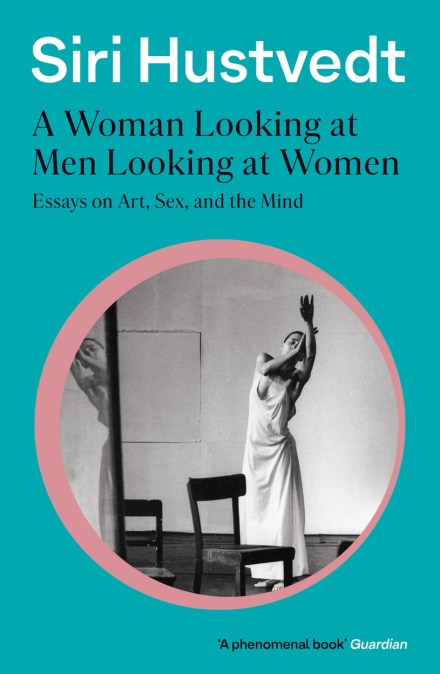‘A great book’
Elif Shafak, Observer
‘Phenomenal’
Guardian
In this remarkable collection of essays, Siri Hustvedt confirms her reputation as one of our most important contemporary writers, bringing a feminist, interdisciplinary perspective to subjects across the humanities and sciences.
The book’s first section explores the complexities of perception and art, with Louise Bourgeois, Pablo Picasso, and Karl Ove Knausgaard among those who come under her scrutiny. In the book’s central essay she explores the intractable mind-body problem, and in the final section she reflects on the mysteries of hysteria, synesthesia, and memory.
With astounding clarity, passion, and wit, Hustvedt exposes gender bias, upends received ideas, and challenges her reader to think again.
‘A writer with an unusual blend of incisive intelligence, humour and imagination . . . we are fortunate to have Hustvedt voicing doubt so intelligently’
Lara Feigel, Financial Times
Elif Shafak, Observer
‘Phenomenal’
Guardian
In this remarkable collection of essays, Siri Hustvedt confirms her reputation as one of our most important contemporary writers, bringing a feminist, interdisciplinary perspective to subjects across the humanities and sciences.
The book’s first section explores the complexities of perception and art, with Louise Bourgeois, Pablo Picasso, and Karl Ove Knausgaard among those who come under her scrutiny. In the book’s central essay she explores the intractable mind-body problem, and in the final section she reflects on the mysteries of hysteria, synesthesia, and memory.
With astounding clarity, passion, and wit, Hustvedt exposes gender bias, upends received ideas, and challenges her reader to think again.
‘A writer with an unusual blend of incisive intelligence, humour and imagination . . . we are fortunate to have Hustvedt voicing doubt so intelligently’
Lara Feigel, Financial Times
Newsletter Signup
By clicking ‘Sign Up,’ I acknowledge that I have read and agree to Hachette Book Group’s Privacy Policy and Terms of Use
Reviews
A writer with an unusual blend of incisive intelligence, humour and imagination. There is a moving essay on the blurring of gender in Louise Bourgeois and a brilliantly comic analysis of Karl Ove Knausgaard . . . She is able to combine [a] personal perspective with erudite analysis and, as the personal perspective is at the forefront, she is always open to uncertainty, which she sees, rightly, as itself a political stance . . . as the complicated warnings of experts are decried and swaggering lies broadcast on the news, this kind of uncertainty matters more than ever . . . We are fortunate to have Hustvedt voicing doubt so intelligently.
It is obvious that hers is a great mind that is constantly exploring, searching, "becoming" . . . An impressive collection by a novelist who clearly loves the humanities, the sciences and the ancient art of storytelling. But Hustvedt is not only a writer. She is also a passionate reader and therein lies the secret of this book . . . Here is a great book that invites reading . . . not only to 'look at a woman writer looking at men looking at women', but also to look within, deep inside the recesses of our minds, so as to recognise the fascinating complexity but also the heartbreaking fragility of human existence.
Few writers eviscerate bias and flawed logic as elegantly and ruthlessly as Hustvedt . . . she expertly flays assertions about biological and psychological sex differences . . . Hustvedt does not resolve her many questions, but her exhilarating conclusion testifies to the virtues of doubt . . . Her work is cerebral but also warm, deeply felt.
[Hustvedt] impresses as a writer of blazing intelligence and curiosity . . . This is fertile and fascinating territory for scientists and humanists alike.
[The Delusions of Certainty] reads like the work of a talented teacher who has the drive and the ability to organise and present - in an exceptionally clear, clean, even limpid voice - a monumental amount of abstract information. It's hard to overstate the pleasure and the comfort that such demystification provides the scientifically uninitiated; it does indeed make the world feel larger, more expansive, more alive to the touch
This is a phenomenal book. Its soul is in the connections it draws between disparate subjects, through which Hustvedt manages to shrink the world into something comprehensible.
A writer with an unusual blend of incisive intelligence, humour and imagination. There is a moving essay on the blurring of gender in Louise Bourgeois and a brilliantly comic analysis of Karl Ove Knausgaard . . . She is able to combine [a] personal perspective with erudite analysis and, as the personal perspective is at the forefront, she is always open to uncertainty, which she sees, rightly, as itself a political stance . . . as the complicated warnings of experts are decried and swaggering lies broadcast on the news, this kind of uncertainty matters more than ever . . . We are fortunate to have Hustvedt voicing doubt so intelligently.
It is obvious that hers is a great mind that is constantly exploring, searching, "becoming" . . . An impressive collection by a novelist who clearly loves the humanities, the sciences and the ancient art of storytelling. But Hustvedt is not only a writer. She is also a passionate reader and therein lies the secret of this book . . . Here is a great book that invites reading . . . not only to 'look at a woman writer looking at men looking at women', but also to look within, deep inside the recesses of our minds, so as to recognise the fascinating complexity but also the heartbreaking fragility of human existence.
Few writers eviscerate bias and flawed logic as elegantly and ruthlessly as Hustvedt . . . she expertly flays assertions about biological and psychological sex differences . . . Hustvedt does not resolve her many questions, but her exhilarating conclusion testifies to the virtues of doubt . . . Her work is cerebral but also warm, deeply felt.
[Hustvedt] impresses as a writer of blazing intelligence and curiosity . . . This is fertile and fascinating territory for scientists and humanists alike.
[An] erudite collection . . . The book conveys the wide range of Hustvedt's reading as she focuses on the interstices between people; between disciplines; and between concepts such as art and science, truth and fiction, feeling and perception. The research is sound and the scholarship engaging, and the exacting prose turns humorous and almost warm when Hustvedt incorporates her personal reflections
A wide-ranging, irreverent, and absorbing meditation on thinking, knowing, and being
[The Delusions of Certainty] reads like the work of a talented teacher who has the drive and the ability to organise and present - in an exceptionally clear, clean, even limpid voice - a monumental amount of abstract information. It's hard to overstate the pleasure and the comfort that such demystification provides the scientifically uninitiated; it does indeed make the world feel larger, more expansive, more alive to the touch
This is a phenomenal book. Its soul is in the connections it draws between disparate subjects, through which Hustvedt manages to shrink the world into something comprehensible.

